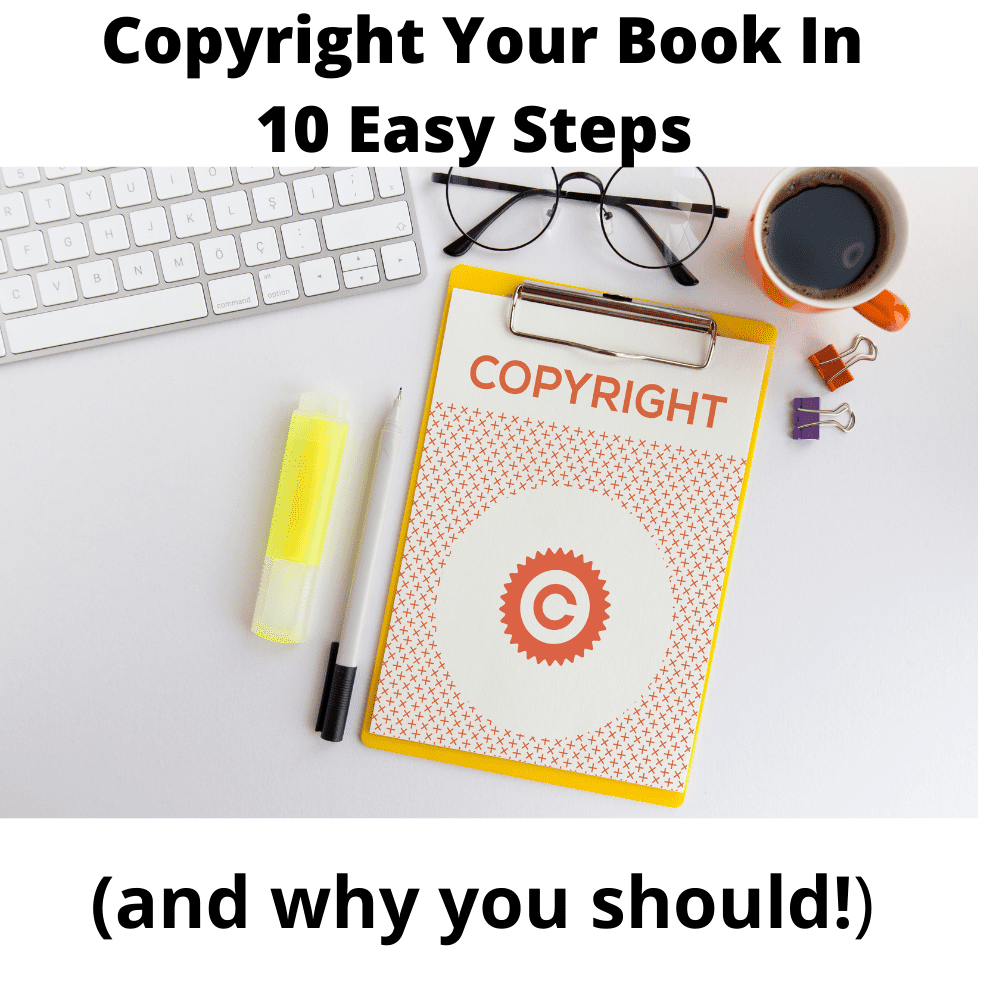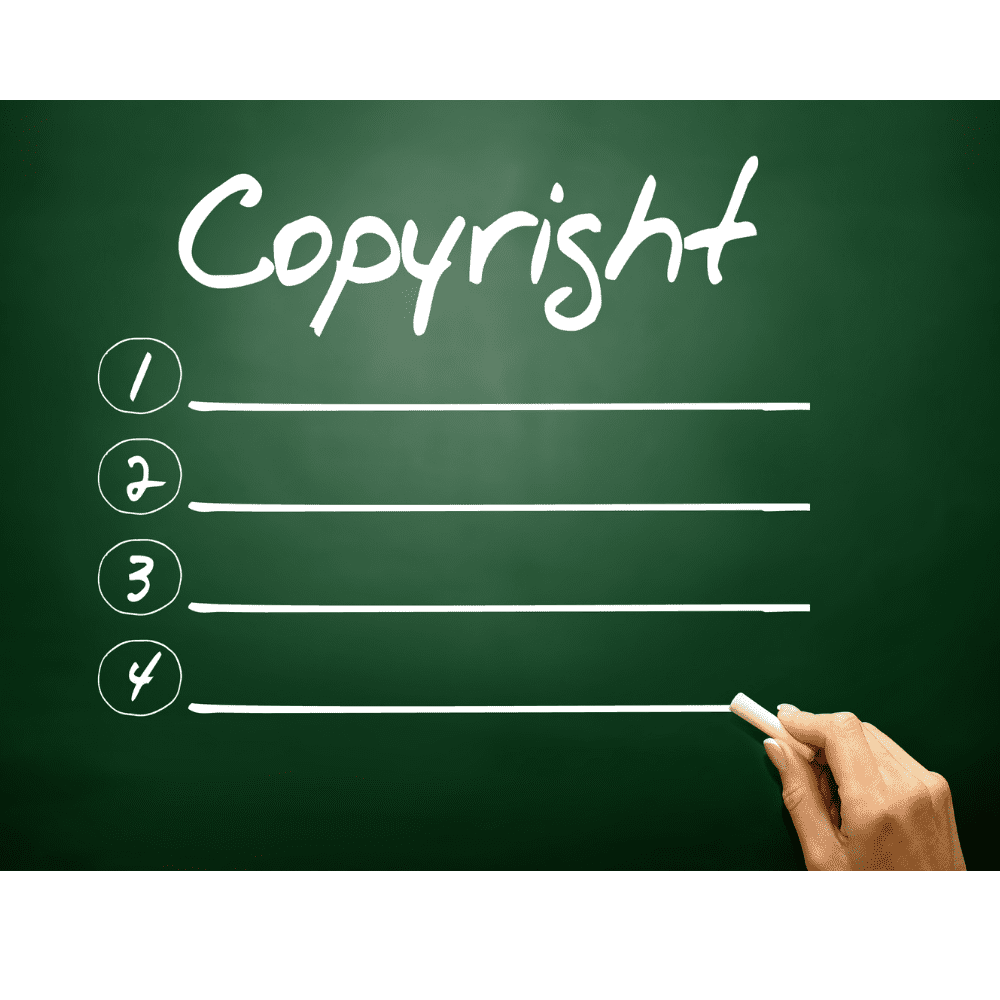How to Copyright Your Book In 10 Easy Steps (and Why You Should!)
Should I copyright my novel? And when? These are questions that every author has to work through. Want the short version? YES, and NOW. However, if you want the longer version, stick around while I show you why copyrighting your novel is important and how to easily get it done.

Copyrighting is a very important step in the self-publishing process and it’s easily overlooked or put off because it sounds like a complicated process. It’s really pretty simple. It is the U.S. Government stating that this is your creative work and you are the only one who can profit from it, unless you give express consent to someone else (like a publisher). You have the right to reproduce or make copies of your work. You have the right to display or perform your work. You have the right to distribute your work and you have the right to create a spin-off of your work. A registered copyright also lasts 70 years after your death.
In this age of self-publishing, plagiarism happens more frequently than you think. You get through all the writing, edits, graphic design and formatting and think you’re finally done and can hit publish. A few months later you find your book, maybe with a different cover or maybe not, with someone else’s name on it. I’ve seen it happen. It’s a horrible feeling knowing that someone stole your hard-earned creation.
While it’s true that your writing is theoretically protected the minute you’ve written your first sentence, a registered copyright is a public record of your ownership of this work. A simple registered copyright will protect you should it ever get plagiarized or outright stolen and gives you easily producible verifiable proof that you indeed are the original author. This is helpful should you ever be faced with working with the many different publishing platforms (like Amazon) to get plagiarized works taken down. If you actually have a real person on the other end of that stolen work, not hiding behind a fake account, and it goes to court then your registered copyright will hold up in court AND gives you the ability to recover attorney’s fees and statutory damages up to a certain amount.

Can’t I just mail myself a printed copy of my work?
I’ve heard some authors say to print your manuscript out and mail it (or email it) to yourself right after publication and don’t open the envelope (often called a “poor man’s copyright”). It has a date stamp on it and it is sealed proving that it was published by you before this date. There’s one problem with this: it doesn’t hold up in court at all. With postage rates these days, it’s not a bargain either.
What happens if I don’t get a registered copyright?
Well, if you don’t have a registered copyright and someone plagiarizes your work, you have no recourse to get them to stop distributing it. They’re infringing on your intellectual property and stealing profit but you can’t bring a suit against them without a registered copyright from the U.S. Copyright office. So you’ll be out of luck and worse, I’ve seen some plagiarists turn around and accuse the original author of plagiarism! If they go register it and try to sue you, guess who will have a very difficult uphill battle in proving they own the work? You will! Not at all worth the potential headache to save $45 and a little time.
Can I mail in the application?
Getting a registered copyright to your work is a simple online process these days. If you want to send in a paper application, you can but it costs $125 (instead of $45 online) and you have to wait a long time (up to a year) for the application to process. You also have to include a paper copy of your work. The day that the U.S. Copyright office receives your application becomes the effective date of your registered copyright. So there are definite advantages to doing it online.
Should I copyright my book before sending it to an editor (graphic designer, agent, publisher)?
Not necessarily. Your book will go through many revisions with an editor. A graphic designer will add a cover. A formatter will make it ready for publication. You’ll want to copyright all of that as part of your book. Unless you’re dealing with unscrupulous characters, these are professionals who make their income from providing services to you, the author. They aren’t going to ruin their livelihoods and reputations by stealing a book on the slim chance it would turn them enough of a profit to risk losing what they’re earning now and in the future. It’s a good idea to copyright your book as soon after publication as possible. Publication here means the day you first sell or distribute a copy of your work. If you have previously published works that aren’t copyrighted, the U.S. Copyright office urges you to register your works “within 3 months of the publication date or before any infringement takes place” so get it done as quickly as possible.
It’s simple, relatively inexpensive, and quick to follow the steps I’ve outlined below.

Copyright in 10 Easy Steps
- Go to the copyright.gov portal
- Click on “Learn More” under “Register Your Works”. On this page, click on “Log in to the Electronic Copyright Office (eCO) Registration System”
- On the left side of the screen is the “User Login” box. Create an account by clicking on “If you are a new user, click here to register”
- Fill out the form and click “Next”. Continue to fill out the form and click “Next”. Read through the Usage Terms and click “Next”. Click “Finish” to complete your profile registration
- You will be automatically logged into the eCO portal where you can submit a Standard Application (commonly used for most authors submitting a single work) and check on application status.
- On the left sidebar under “Copyright Registration” and “Register A Work”, click on “Standard Application”
- Read through this page and click on “Start Registration”
- There are twelve short sections to this form, read each carefully and fill them out
- Pay the required fee. At the time of writing this article, it is $45 for a single literary work online or $125 if you mail it in by paper.
- Upload the most complete copy of your work (fastest method)
Voila! Provided your application is approved, you have a registered copyright of your work as public record of your ownership, effective the day you submitted your application. You have saved yourself an immense amount of work and headache down the road if someone attempts to steal your creative work and intellectual property (and those scam artists are out there!)
If you like this article, please share it on Facebook. Want to read more? Please go like and follow my Facebook page HERE for upcoming articles. Please visit my website HERE, if you’d like to know more about my editing and proofreading services. You can also follow me on Pinterest HERE and on Twitter HERE.
Thank you so much for these tips.